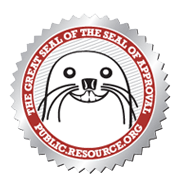Address
Text
Thank you very much Paul Courant.
Mark Sandler, congratulations for doing that GPO work.
That is actually ... there's been ... I would not say opposition from the Government Printing Office, but certainly stonewalling.
And so the fact that CIC has gone forward with that is I think a real testimony to what they're doing.
There has arisen a bright line between government and the rest of our country. A line, or maybe a ditch, a moat, even an ocean, it is a feeling that government is only relevant to those inside the beltway.
The feeling is that government is only relevant to lobbyists from large entrenched interests with offices on K Street, only relevant to a government bureaucracy that is somehow not a part of our country or in touch with the rest of us.
That rhetoric is wrong.
There is also a bright line that has arisen between the capabilities of our government and those of the private sector, a bright line that has led to a reliance on private contractors to do the real work of government, to an outsourcing of democracy, to some spectacularly bad deals.
Take the Government Accountability Office, which maintains the legislative history of every law. They packed those 50 million pages of paper up and sent them, at government expense, to the Thomson Corporation, which digitized them and turned them into a product. Thomson sent those valuable papers back to the government. And, what did the government get in return? A couple logins for a couple of staffers, but even members of Congress must now pay to access this Thomson product.
This is based on a perception that government can only spend money, and it must rely on profiteers to do the real work of government.
That rhetoric is also wrong.
The question before us today is whether government is relevant to a Digital Public Library of America, whether the works of government are relevant to Americans, whether we can jump that wall, whether we should jump the wall.
Take the regulations promulgated by our executive branch, the edicts of government. The Code of Federal Regulations is 170,000 pages of dense text. The regulations of our 50 states are another million pages.
These are rules relevant to every person. These are the OSHA safety regulations that every business owner and factory worker must obey. These are the hazmat transport and storage regulations, the product safety regulations for hearing aids and baby strollers and propane tanks and elevators.
Are these edicts of government available to citizens to inform themselves? Are they available for publishers that wish to make them more readable? Are they available for businesses that must obey them? Are they available to students that wish to learn?
At the state level, Stanford University and the American Association of Law Libraries did a National Inventory of Legal Materials. They found that the regulations of the 50 states are a paragon of unusability, an abomination of bad HTML and atrocious graphics. They found that 26 states assert copyright and prohibit reuse of their regulations.
At the federal level, the Federal Register, the official newspaper of government, is only available going back a few years (although kudos are due to Mr. Ferriero for the amazing transformation he has made in that publication since he took office).
The Code of Federal Regulations, the codification of our rules, is only available in very bad unformatted text or even worse SGML, a technology that became old in the 1970s.
There is an XML version of the CFR that was created by Cornell with considerable cooperation from the Government Printing Office, but those parties agreed that the XML would not be made available so that Cornell could "monetize their investment," making money on this valuable part of the public domain. The theory is government has no choice, because why would anybody want to make government better unless they can make a profit?
This rhetoric is also wrong! It hurts democracy. Government should not condone this. The American people should not stand for it.
There is one more consideration. The CFR is 170,000 pages, but that is only the visible part. There are many tens of thousands of pages that are incorporated by reference, made part of the official law of the land but only available by paying money to private parties.
We are not talking trivial amounts of money. A mandatory safety standard from Underwriters Laboratories costs $850. A 4-page document about how one must test for lead paint costs $64. The IEEE dictionary of electronic terms costs $500, and that vocabulary forms the basis for many procurement actions.
Much of the CFR is hidden behind a cash register, a poll tax on access to justice.
You can't read our Fuel and Gas Code, the Life Safety Fire Code, the Fireworks Safety Standards, or the Water Hygiene Guidelines without an American Express card.
I brought some examples. Here is the mandated standard for Disinfecting Water Mains, for $72.
The Safety Requirements for Window Cleaning, for $60. The Safety Requirements for Wheeled Child Conveyances at $217. The American National Standard for Power Operated Pedestrian Doors costs $40. The Performance Requirements for Hot Water Dispensers is $45 as are the Performance Requirements for Pressurized Flushing Devices, known as Flushometers. The critical hazmat standard for the Welding of Pipelines and Related Facilities is $125, and the standard for the Disinfection of Wells is $72. The Standard for Construction and Approval for Transportation of Fireworks, Novelties, and Theatrical Pyrotechnics is $60 if you want a safe Independence Day.
These regulations are one small part of the information in our government storehouses. Geneology, the law, the economy, science, the arts, all this information is relevant to people in their day-to-day lives. This is useful information. This is information vital to education. Just imagine if law students could see video of Laurence Tribe arguing before the Supreme Court? If engineering students could read the technical safety standards and make them better?
Government information is useful to people, but the reverse is true. People, and institutions like a Digital Public Library of America, can help government make information available, to avoid bad partnerships, to find problems like privacy violations in documents. People can make government better because we are the government, and an informed citizenry is not just a desirable attribute of a democracy, but a prerequisite.
John Adams made that point so eloquently when he said that if we believe that "truth, liberty, justice, and benevolence are the everlasting basis of law and government," then we must arm our citizens with knowledge. This right to bear knowledge is far more important than the Second Amendment, government information shouldn't be a conceal-carry privilege for the rich, the knowledge lobby should be far more powerful than the gun lobby.
John Adams said we must "let the public disputations become researches into the grounds and nature and ends of government," we must "spread far and wide the ideas and the sensations of freedom." He said that "we must let every sluice of knowledge be opened and set a-flowing."
That is our job as citizens, that is our government's job, that is our society's responsibility as a democracy. That is the opportunity we must face as we build a Digital Public Library of America.

